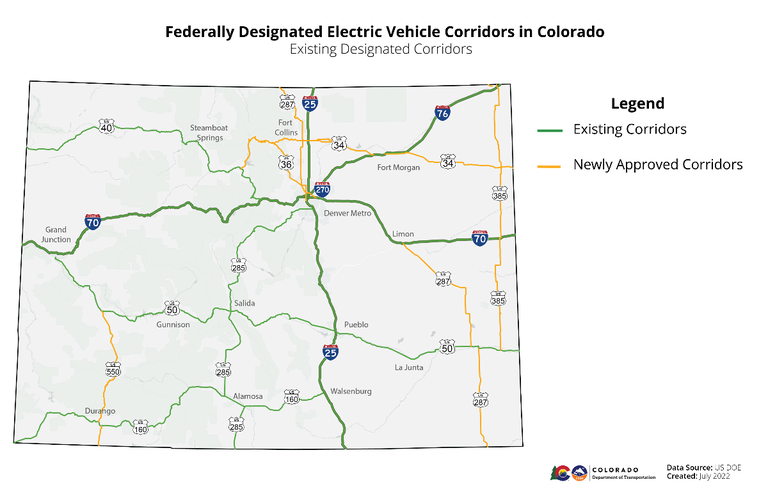More Colorado roads now eligible for federal money to build electric chargers
News Release
Statewide — Colorado's ability to create a network of electric vehicle-friendly roadways just got even better thanks to the Federal Highway Administration's decision to approve all six stretches of road the state wanted to add to a national network of highways meant to extend EV travel options.
The FHWA's decision, made this month, will increase the size of Colorado's National Electric Vehicle Infrastructure corridor system from 2,193 road miles to 3,164 miles — a 44% increase. This expansion will enable more roads in the state to be eligible for some of the $57 million in funding that Colorado is receiving over the next five years to build EV chargers.
Established by the Infrastructure Investment and Jobs Act (IIJA), the National Electric Vehicle Infrastructure (NEVI) formula program funding will provide $5 billion over five years for states to deploy DC fast electric vehicle (EV) chargers along highway corridors. The funds can only be used within one mile of federally approved designated corridors and there must be less than a 50-mile gap between chargers.
The NEVI program is aimed at building out a national system of EV chargers to connect states and help drivers of EVs travel longer distances with the confidence they can find chargers. The program pays up to 80% of eligible costs for charging infrastructure.
Under the program, CDOT does not own or operate any chargers itself. Rather, the program awards grants to private, public, and nonprofit entities that want to build, own, maintain and operate chargers.
"Colorado is poised to build one of the most robust EV charging networks in the country," said Kay Kelly, chief of innovative mobility for the Colorado Department of Transportation. “These newly designated corridors mean that we have significantly more road miles eligible for federal funding to help build chargers and bring EVs and cleaner air to all Coloradans.”
The designation of additional EV corridors and the future investment of $57 million in federal funds will support Colorado's continued progress toward electrifying the state transportation system. CDOT and its agency partners have a goal of 940,000 light-duty zero-emission vehicles (ZEVs), 1,000 transit ZEVs and 35,000 medium- and heavy-duty ZEVs operating in the state by 2030. New funding for charging infrastructure buildout will support this effort and augment the existing Charge Ahead Colorado, DC Fast Charging Corridors, DC Fast Charging Plazas and EV Byways and Tourism grant programs.
The newly designated corridors include I-270, US 34, US 36, US 287, US 385 and US 550. Existing corridors include I-25, I,70, I-76, US 40, US 50, US 160 and US 285.

Colorado is expected to receive $57 million over the next five years to create an EV charging network across the state. Each state is required to submit an EV infrastructure deployment plan that describes how the state intends to use its apportioned NEVI funds. The plan is required to access NEVI formula program funding and is due to the Joint Office of Energy and Transportation by Aug. 1.
Colorado’s NEVI plan will address contracting with third parties, public engagement, equity for rural and disadvantaged communities, workforce considerations, cybersecurity concerns and more.
In addition to the many environmental benefits for communities, especially those disproportionately impacted by heavy vehicle traffic and emissions, the proliferation of EV chargers will help create many new jobs to install, maintain and operate these stations.
CDOT wants to hear from the public on the draft NEVI plan.
To participate in the NEVI plan development, visit the NEVI webpage and subscribe to our mailing list. Complete and share our National Electric Vehicle Infrastructure online survey.
Two virtual public meetings are scheduled for Tuesday to discuss the NEVI plan and get public input. The first NEVI plan meeting is from 2 p.m. to 3 p.m. and requires Webinar Registration for Public Meeting #1 beforehand. The second NEVI plan meeting is from 6 p.m. to 7 p.m. and also requires a different Webinar Registration for Public Meeting #2 beforehand.
A draft of the NEVI plan is now available for public comment via email at [email protected]
